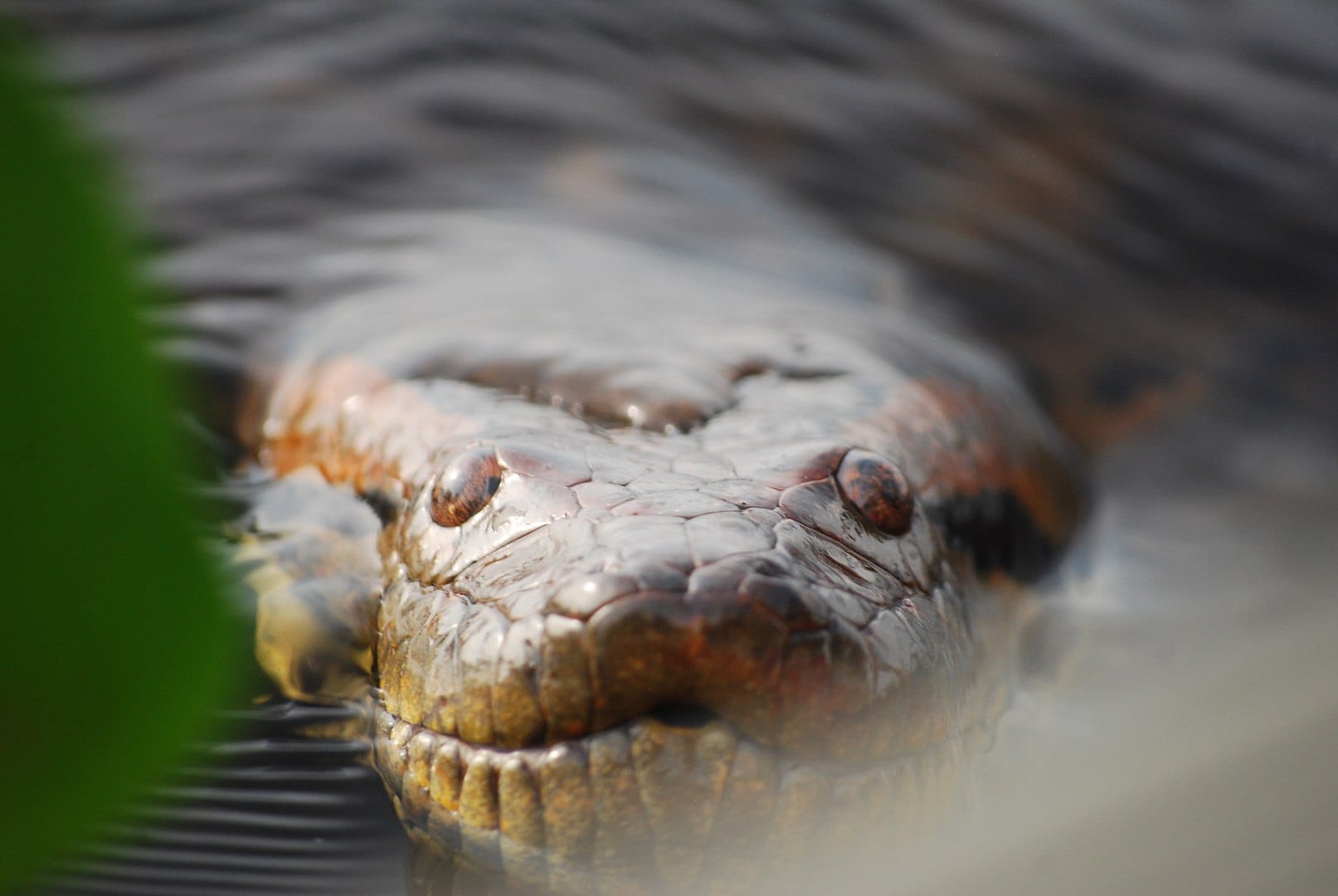Welcome back to the Abstract!
This week, we’re moving in next to anacondas, so watch your back and lock the henhouse. Then, parenthood tips from wild baboons, the “cognitive debt” of ChatGPT, a spaceflight symphony, and a bizarre galaxy that is finally coming into view.
When your neighbor is an anaconda
Anacondas are one of the most spectacular animals in South America, inspiring countless myths and legends. But these iconic boas, which can grow to lengths of 30 feet, are also a pest to local populations in the Amazon basin, where they prey on livestock.
To better understand these nuanced perceptions of anacondas, researchers interviewed more than 200 residents of communities in the várzea regions of the lower Amazon River about their experiences with the animals. The resulting study is packed with amazing stories and insights about the snakes, which are widely reviled as thieves and feared for their predatory prowess.
“Fear of the anaconda (identified in 44.5% of the reports) is related to the belief that it is a treacherous and sly animal,” said co-authors led by Beatriz Nunes Cosendey of the Mamirauá Sustainable Development Reserve and Juarez Carlos Brito Pezzuti of the Federal University of Pará.
“The interviewees convey that the anaconda is a silent creature that arrives without making any noise, causing them to feel uneasy and always vigilant during fishing…with the fear of having their canoe flooded in case of an attack,” the team added. “Some dwellers even reported being more afraid of an anaconda than of a crocodile because the latter warns when it is about to attack.”
But while anacondas are eerily stealthy, they also have their derpy moments. The snakes often break into chicken coops to feast on the poultry, but then get trapped because their engorged bodies are too big to escape through the same gaps they used to enter.
“Dwellers expressed frustration at having to invest time and money in raising chickens, and then lose part of their flock overnight,” the team said. “One interviewee even mentioned retrieving a chicken from inside an anaconda’s belly, as it had just been swallowed and was still fresh.”
Overall, the new study presents a captivating portrait of anaconda-human relations, and concludes that “the anaconda has lost its traditional role in folklore as a spiritual and mythological entity, now being perceived in a pragmatic way, primarily as an obstacle to free-range poultry farming.”
Monkeying around with Dad
Coming off of Father’s Day, here is a story about the positive role that dads can play for their daughters—for baboons, as well as humans. A team tracked the lifespans of 216 wild female baboons in Amboseli, Kenya, and found that subjects who received more paternal care had significantly better outcomes than their peers.
“We found that juvenile female baboons who had stronger paternal relationships, or who resided longer with their fathers, led adult lives that were 2–4 years longer than females with weak or short paternal relationships,” said researchers led by David Jansen of the Midwest Center of Excellence for Vector-Borne Disease. “Because survival predicts female fitness, fathers and their daughters may experience selection to engage socially and stay close in daughters’ early lives.”
This all reminds me of that old episode of The Simpsons where Lisa calls Homer a baboon. While Homer was clearly hurt, it turns out that baboons might not be the worst animal-based insult for a daughter to throw at her dad.
A case for staying ChatGPT-Free
ChatGPT may hinder creativity and learning skills in students who use it to write essays, relative to those who didn’t, according to an exhaustive new preprint study posted on arXiv. This research has yet not been peer-reviewed, and has a relatively small sample size of 54 subjects, but it still contributes to rising concerns about the cognitive toll of AI assistants.
Researchers led by Nataliya Kosmya of the Massachusetts Institute of Technology divided the subjects — all between 18 and 39 years old — into three groups wrote SAT essays using OpenAI’s ChatGPT (LLM group), Google’s search engine, or with no assistance (dubbed “Brain-only”).
“As demonstrated over the course of 4 months, the LLM group's participants performed worse than their counterparts in the Brain-only group at all levels: neural, linguistic, scoring,” the team said. “The LLM group also fell behind in their ability to quote from the essays they wrote just minutes prior.”
When I asked ChatGPT for its thoughts on the study, it commented that “these results are both interesting and plausible, though they should be interpreted cautiously given the early stage of the research and its limitations.” It later suggested that “cognitive offloading is not always bad.”
This study is a bop
Even scientists can’t resist evocative language now and then—we’re all only human. Case in point: A new study likens the history of Asia’s space industry to “a musical concert” and then really runs with the metaphor.
“The region comprises a diverse patchwork of nations, each contributing different instruments to the regional space development orchestra,” said researchers led by Maximilien Berthet of the University of Tokyo. “Its history consists of three successive movements” starting with “the US and former USSR setting the tone for the global space exploration symphony” and culminating with modern Asian spaceflight as “a fast crescendo in multiple areas of the region driven in part by private initiative.”
Talk about a space opera. The rest of the study provides a comprehensive review of Asian space history, but I cannot wait for the musical adaptation.
Peekaboo! I galax-see you
In 2001, astronomer Bärbel Koribalski spotted a tiny galaxy peeking out from behind a bright foreground star that had obscured it for decades, earning it the nickname the “Peekaboo Galaxy.” Situated about 22 million light-years from the Milky Way, this strange galaxy is extremely young and metal-poor, resembling the universe’s earliest galaxies.
A new study confirms Peekaboo as “the lowest-metallicity dwarf in the Local Volume,” a group of roughly 500 galaxies within 36 million light-years of Earth.
“This makes the Peekaboo dwarf one of the most intriguing galaxies in the Local Volume,” said co-authors Alexei Kniazev of the South African Astronomical Observatory and Simon Pustilnik of the Special Astrophysical Observatory of the Russian Academy of the Sciences. “It deserves intensive, multi-method study and is expected to significantly advance our understanding of the early universe’s first building blocks.”
Thanks for reading! See you next week.
Update: The original headline for this piece was "Is ChatGPT Rotting Our Brains? New Study Suggests It Does." We've updated the headline to "ChatGPT May Create 'Cognitive Debt,' New Study Finds" to match the terminology used by the researchers.

